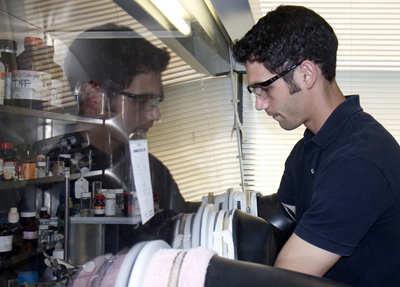Sources: Scott McCall, smccall@k-state.edu;
Stefan Kraft, 785-532-6431, skraft@k-state.edu;
and Gary Conrad, 785-532-6662, gwconrad@k-state.edu
Photo available. Contact media@k-state.edu or 785-532-6415.
Video available. Access at http://www.k-state.edu/media/webzine/research/index.html
News release prepared by: Kristin Hodges, 785-532-6415, khodges2@k-state.edu
Thursday, June 4, 2009

K-STATE SENIOR RESEARCHES THE CONVERSION OF METHANE, THE IMPROVEMENT OF AN ANTI-CANCER DRUG AND THE MECHANISMS OF A LASIK EYE SURGERY PROCEDURE
MANHATTAN -- A Kansas State University student has been a lead researcher on three separate projects that have wide implications in the health, medical and energy fields.
K-State's Scott McCall, senior in biology and biochemistry, Parker, Colo., got his start in research as a freshman in the lab of Stefan Kraft, assistant professor of chemistry at K-State.
"What sets Scott apart is his ability to directly apply classroom knowledge to the bench, his commitment to spend endless hours in the lab, his ability to design and refine difficult experiments independently, his good hands that allow him to work in a biological lab and, ultimately, his deep curiosity about science in general," Kraft said.
One of McCall's projects is working with Kraft to convert methane, an abundant energy source, into methanol, which is combustible and easy to transport. Kraft said McCall's project involves the chemical activation of hydrocarbons by using palladium -- a rare metal -- as a catalyst.
"Ultimately, it's an alternative energy-derived project," McCall said. "Essentially, most of the methane from oil drilling is just released into the atmosphere, but there have been a lot of attempts made to convert that into something that is a lot more usable."
McCall developed another project out of his methane activation research. Using his knowledge of palladium systems, he wrote grants with Kraft for a cancer research project in collaboration with Jean-Pierre Perchellet, professor of biology at K-State.
McCall is working with a platinum-based anti-cancer drug and is using the synthesis and developments from his research with Kraft to potentially stabilize the platinum and help make it better for anti-tumor activity.
McCall's third project involves LASIK eye surgery and is being done with Gary Conrad, university distinguished professor of biology at K-State. The project centers on keratoconus, an eye disease where the central part of the eye thins.
A procedure was developed involving riboflavin and ultraviolet radiation that stopped the progression of the disease, and cured it in some cases, but it was not understood why or how the procedure worked, McCall said. Conrad and McCall worked in collaboration with a clinical trial at the Emory University School of Medicine to study the mechanisms of the procedure.
McCall served a fellowship with Conrad in summer 2008 at the Mount Desert Island Biological Laboratory in Bar Harbor, Maine. The two were able to do a comparative physiology study of the structurally different eyes of sharks and rabbits. Through their research, they found that oxygen is what makes the procedure work.
"Scott is one of the brightest undergraduates we have ever had in our research lab," Conrad said. "He is a joy to collaborate with because he keeps coming up with new ideas of his own based on his own reading of the published research literature. He is phenomenal and he works very, very hard."
McCall presented the LASIK research at the Undergraduate Summer Research Symposium of the Mount Desert Island Biological Laboratory and at the Kansas IDeA Network of Biomedical Research Excellence, know as K-INBRE, Symposium in January. He also gave a poster presentation on the research at the annual meeting of the Association for Research in Vision and Ophthalmology. In addition, he presented his methane research in April at a graduate seminar at K-State.
"It really has been a growing experience," McCall said. "It's given me direction as far as what I want to do in life in a lot of ways. There were times when I've been burnt out on these projects, and I've realized that not only is that part of it, but the perseverance and the kind of understanding and developments that come out of these frustrations is not only a natural part of the process, but probably a good part as well."
The cancer project is funded through K-State's Terry C. Johnson Center for Basic Cancer Research.
McCall will serve an internship this summer at Johns Hopkins University School of Medicine, Baltimore, Md., in the lab of Gerald Hart, director of the department of biological chemistry. He plans to pursue another internship in the fall before graduating from K-State. He would then like to earn a dual M.D.-Ph.D. and work in pharmaceutical research and drug development.
"I like being able to apply my research and really see results. I like seeing a real tangible impact from that, and part of that to me is being able to be in the clinic and have that gratification of working with patients," McCall said.
McCall has shadowed at several medical clinics, including at the congenital heart surgery unit at the Texas Children's Hospital. He was a 2008 Barry M. Goldwater scholar and has been a member of the K-State National Intercollegiate Rodeo Association rodeo team. A 2006 graduate of Cherry Creek High School, Greenwood Village, Colo., he is the son of Marc and Lori McCall.